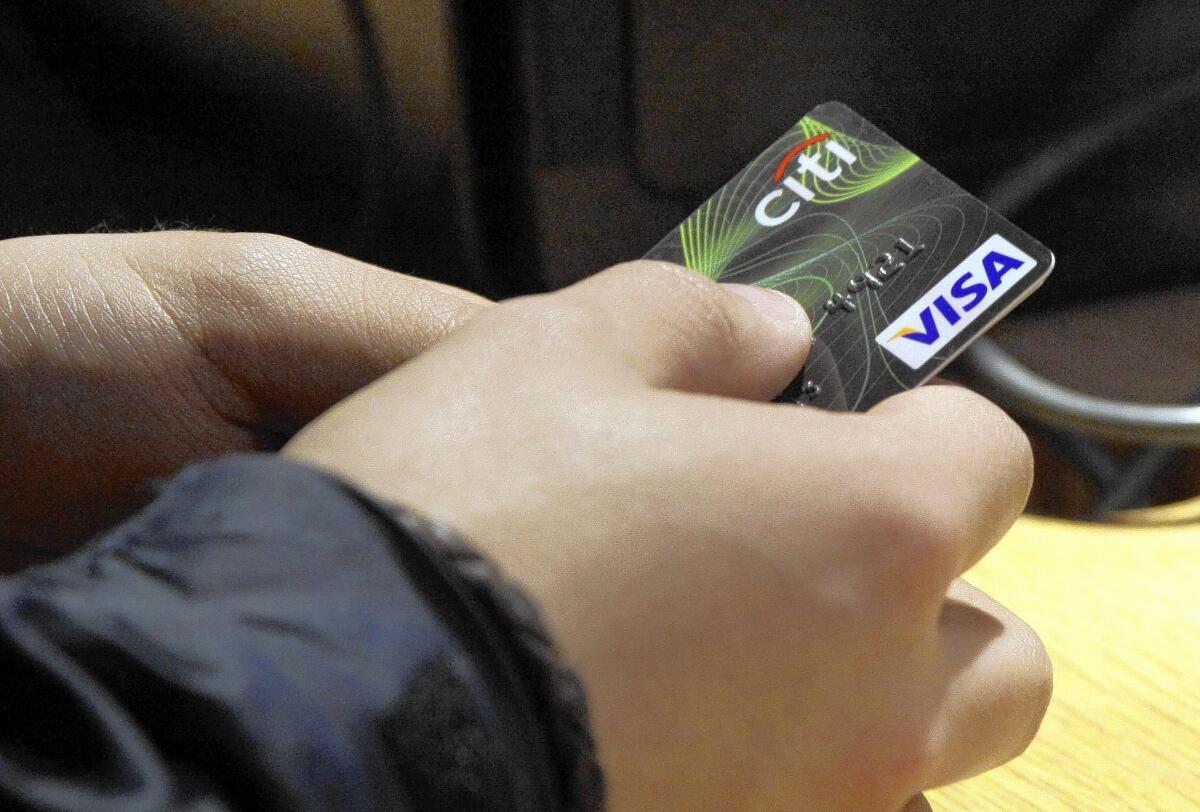Helping a son with horrible credit scores

- Share via
Dear Liz: My 33-year-old son has horrible credit scores. If I added his name to my credit card, would it have a positive effect on his score without any negative ramifications to mine? Could any of his creditors come after me?
Answer: Adding someone to your credit card as an authorized user can have a positive effect on their credit scores without negatively affecting your own or obligating you to pay their other debts. You would be responsible for any debt your authorized user incurred on the card.
In your son’s case, though, being added as an authorized user probably won’t help much.
When someone has fallen behind on their bills, the effect on their scores depends on three main factors: recency (how recently did a late payment occur?), severity (how far behind are they — 30 days, 60 days, 90 days or more?) and frequency (how many accounts have late payments?).
One skipped payment can knock 100 points or more off good scores but won’t result in “horrible” credit. Truly bad credit typically requires someone to be well behind on a number of accounts in the recent past. The fact that you’re worried about his creditors indicates that he may not have resolved his financial problems enough to start rebuilding his credit.
What he should do now depends on his circumstances.
If he still has a job, he may be able to arrange a payment plan or settle debts with collectors. If his income has dropped or he’s otherwise unable to pay, he may need to consider bankruptcy.
Many people are better off paying down their debt on their own rather than taking out another loan.
Once his past debts are resolved — either paid, settled or legally erased — he can take steps to improve his credit, one of which could include being added to your card. A credit builder loan, offered by many credit unions, also could help, as could a secured credit card, which requires a deposit.
It’s crucial that he be able to make all his payments on time, however. If he falls behind again, he’ll offset any progress that’s been made.
IRS pays interest on late refunds
Dear Liz: I filed my return electronically with direct deposit. I have yet to receive my refund or that stimulus relief check. We have to pay interest on any late tax payment. Will the IRS pay interest on late refunds?
Answer: The IRS has said it will pay interest on late refunds if the return was filed by July 15, the extended tax deadline. The interest “will generally be paid from April 15, 2020, until the date of the refund,” the IRS says on its site. Don’t expect to get rich: The interest rate for the second quarter, which ended June 30, is 5% a year, while the interest rate for the third quarter, which ends Sept. 30, is 3% a year.
IRA conversions and taxes
Dear Liz: You recently advised a reader that if their income was too high to contribute to a Roth IRA, they could still contribute to an IRA or any after-tax options in their 401(k). You didn’t mention a two-step Roth IRA — first making a nondeductible contribution to an IRA and then immediately converting that amount to a Roth. That way those people whose income is too high to contribute to a direct Roth IRA can still have a Roth IRA using the two-step process.
Answer: This is known as a backdoor Roth contribution, which takes advantage of the fact that the income limits that apply to Roth contributions don’t apply to Roth conversions. Conversions, however, typically incur tax bills and don’t make sense for everyone. If you have a substantial amount of pretax money in IRAs, the tax bill can be considerable. (The tax bill is figured using all your IRAs, by the way. You can’t get around it just by contributing to a separate IRA that you then convert.)
Incurring that tax bill could make sense if you expect to be in the same tax bracket in retirement, or in a higher one. If you’re young and a good saver, it’s a good bet that will be the case. Roth conversions also can be advisable later in life if your tax bracket could jump when you reach age 72 and have to start taking required minimum distributions from your retirement accounts.
If you expect to be in a lower tax bracket in retirement, however, you probably should forgo Roth conversions because you’ll pay more now in taxes than you would later.
Of course, if you have little or no pretax money in your IRA, then backdoor conversions get a lot more attractive because the tax bill would be minimal. Otherwise, you should seek out a Roth conversion calculator to get a better idea of whether a conversion might be the right choice.
Liz Weston, Certified Financial Planner, is a personal finance columnist for NerdWallet. Questions may be sent to her at 3940 Laurel Canyon, No. 238, Studio City, CA 91604, or by using the “Contact” form at asklizweston.com.
More to Read
Inside the business of entertainment
The Wide Shot brings you news, analysis and insights on everything from streaming wars to production — and what it all means for the future.
You may occasionally receive promotional content from the Los Angeles Times.











